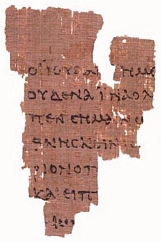
There are twenty-seven books in the New Testament. They were not written by one person or all at once. They were written individually and independently and separately, from three continents.
Written by the apostles and eyewitnesses who were inspired to write over a period of around 50 years.
The last book of the New Testament, Revelation, was believed to have been completed around 95AD by the last surviving apostle of Christ, John.
When these individual documents that later constituted the NT was first written, they proliferated rapidly. The writings were copied and re-copied by hand, over and over and spread far and wide to every early Christian community. They cherished and treasured these writings e.g the gospels, as they came from those who had seen, walked and talked with Jesus Himself. Remember there was no controlling body to oversee the spread of these documents. They were read by the intended recipients and then painstakingly copied by hand again and then sent on to others.

For example, we have a piece of a famous manuscript known as the P52. This piece contains a portion of the gospel of John. What is remarkable is, it is dated around 125 AD and found in Egypt!
What this tells us is that within a short period of time from the actual original writing of this book by John the apostle in Ephesus circa 90AD, a copy of it had made its way to Egypt, more than 1300 kms away within a relatively short period of time!
How can such a tremendous proliferation of text be corrupted? How can it be possible for someone to corrupt the words? Who would do it? How would he gather all the manuscripts from all over the world and make changes? There were hundreds, even thousands of manuscripts in multiple translated languages. This makes it virtually impossible to corrupt!
The early Muslims scholars were able to grasp this fact.
” How could there be any alteration in the Book whose words’ sharpness has reached a great level of circulation in the East and in the West? … For no change can occur in a book that is well circulated among men. Every wise man can see that the alteration of the Bible was impossible for it was well circulated among men of different faith and backgrounds .”
p.327 of Al-Razi’s Third Volume
Al-Razi (856-925 AD)
… the charge of corruption of the Biblical texts makes no sense at all. It would not have been possible for Jews and Christians everywhere to agree on changing the text. Even if those in Arabia had done it, the difference between their book and those of their brothers, let us say in Syria and Europe, would have been obvious…We believe that these Gospel accounts are the true Gospel.
Jacques Jomier, “Jesus, The Life of the Messiah”, C. L. S., Madras, 1974, p.216
Muhammad Abduh (1849-1905)
What are the manuscripts in our possession today?
We have manuscripts from the 2nd century in the original language, dozens more from the 3rd century and we have the complete New Testament in Greek from the early to mid 300s AD. There are over 5,800 complete or fragmented Greek manuscripts, 10,000 Latin manuscripts and 9,300 manuscripts in various other ancient languages, such Syriac, Slavic, Gothic, Ethiopic, Coptic and Armenian. Every year, several New Testament manuscripts handwritten in the original Greek format are discovered.
If we want to see how much the Bible today has changed from the 3rd century to the 21st century, we just need to compare those manuscripts with today’s Bible. We have manuscripts of the full Bible from hundreds of years before Muhammad’s time and they are the same as ours. In fact, our modern English translations are based on those manuscripts.
Muslims take pride that the Quran is the exact words dictated to Muhammad and remains unchanged to this day. The Bible is not a word-for-word recitation. The words of the Bible constitute a MESSAGE. Although words are important, it is the MESSAGE that is of greater importance. Hence, the Bible can be translated into any language, so that the MESSAGE can be conveyed to man, whatever language he speaks. (The Bible has been translated into more than 2500 languages of mankind.)
On the other hand, the Quran’s inspiration is tied to the specific words themselves. The words are trapped and limited in one human language, Arabic. This means that any translation retards the words of Allah. This handicap means it cannot be a book for all mankind.